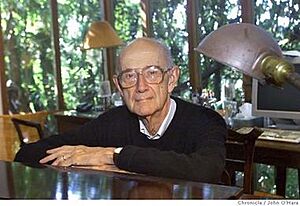Andrew Imbrie facts for kids
Quick facts for kids
Andrew Imbrie
|
|
|---|---|
 |
|
| Born | April 6, 1921 |
| Died | December 5, 2007 (aged 86) |
| Era | Contemporary |
Andrew Welsh Imbrie (April 6, 1921 – December 5, 2007) was an American composer and pianist. He wrote many different kinds of music, especially for orchestras and small groups of instruments. He was also a very important teacher.
Contents
Andrew Imbrie's Life and Work
Andrew Imbrie was born in New York City. He started playing the piano when he was only four years old. When he was 16, in 1937, he traveled to Paris, France. There, he briefly studied how to compose music with a famous teacher named Nadia Boulanger. He also took piano lessons with Robert Casadesus.
Early Studies and War Service
In 1938, Andrew Imbrie came back to the United States. He went to Princeton University and studied with a well-known composer named Roger Sessions. He earned his first degree in 1942. His final project there was a string quartet, which is a piece of music for four string instruments. This piece was even recorded by the famous Juilliard Quartet.
During World War II, Andrew Imbrie served in the U.S. Army. He used his skills as a Japanese translator. After the war, he continued his studies at the University of California, Berkeley. He earned his Master of Arts degree in Music in 1947. He kept studying with Roger Sessions, who had also moved to Berkeley.
Teaching Career and Influence
From 1949 until he retired in 1991, Imbrie taught music at the University of California, Berkeley. He taught students how to compose, understand music theory, and analyze musical pieces. In the summer of 1991, he was a special "Composer-in-Residence" at Tanglewood, a famous music center in Massachusetts.
Besides his main job at Berkeley, he also taught as a visiting professor at many other universities. These included the University of Chicago, Brandeis University, and Harvard University. He also had a regular teaching job at the San Francisco Conservatory.
Andrew Imbrie passed away at his home in Berkeley, California, when he was 86 years old. He taught many students who later became well-known composers themselves. Some of his notable students include Larry Austin, Richard Festinger, and Laura Schwendinger.
Andrew Imbrie's Musical Style
Andrew Imbrie's music was first influenced by the composer Béla Bartók. Later, his teacher Roger Sessions had a big impact on his style. Imbrie liked to use harmonies that were not based on simple chords (called "non-triadic"). If he did use chords, they didn't follow the usual rules of how chords move in music.
He often created music with many independent melodic lines playing at the same time. This is called counterpoint. His music was often atonal, meaning it didn't have a clear home key. However, he made sure his melodies were clear and well-shaped. This helped make his atonal music easier to understand and enjoy. He did not use the "serial techniques" that were popular among many composers after World War II.
Main Musical Works
Andrew Imbrie wrote many different kinds of musical pieces. Here are some of his most important works:
- Three Against Christmas (an opera from 1960)
- Angle of Repose (another opera from 1976)
- Dandelion Wine (a piece for a small group of instruments from 1961)
- To a Traveler (a chamber ensemble piece from 1971)
- Sextet for Six Friends (a chamber ensemble piece from 2007)
- Drumtaps (for a choir and orchestra, using words by Walt Whitman)
- Prometheus Bound (for a choir and orchestra)
- Adam (for a choir and orchestra, using old texts)
- Requiem (a large piece for choir and orchestra from 1984)
- Three symphonies (large pieces for orchestra)
- Eight concertos (pieces for a solo instrument with orchestra)
- Songs for singers
- Sonatas for various instruments (pieces for one or two instruments)
- Chamber works for different groups of instruments
- Works for choirs
- Five string quartets (pieces for four string instruments)
Recordings
- First Recordings of Two Naumburg Award Compositions. Columbia Records, MS 6597
- Violin Concerto
- Andrew Imbrie. New York: Composers Recordings Inc., 1973. Rereleased, New World Records, 2007.
- Symphony No. 3
- Serenade for flute, viola and piano
- Sonata for cello and piano
- New Music for Virtuosos. New York: New World Records, 1977.
- Three Sketches
- Andrew Imbrie and Gunther Schuller. New York: New World Records, 1978.
- String Quartet No. 4
- New Music Series Vol. 3. Neuma Records, 1993
- Short Story
- Collage New Music. Boston: GM Recordings, 1989.
- Pilgrimage
- Andrew Imbrie. Boston: GM Recordings, 1993.
- String Quartets 4 & 5
- Impromptu for Violin and Piano
- Music of Andrew Imbrie. New York: CRI, 1994.
- Symphony No. 3
- Serenade for Flute, Viola and Piano
- Sonata for cello and piano
- Dream Sequence – Chamber Music of Andrew Imbrie. New York: New World Records, 1995.
- Dream Sequence
- Roethke Songs
- Three Piece Suite
- Campion Songs
- To a Traveler
- Andrew Imbrie, Requiem. New Rochelle, NY: Bridge Records, 2000.
- Requiem
- Piano Concerto No. 3
- Andrew Imbrie. Albany, NY: Albany Records, 2002.
- Spring Fever
- Chicago Bells
- Songs of Then and Now
 | Georgia Louise Harris Brown |
 | Julian Abele |
 | Norma Merrick Sklarek |
 | William Sidney Pittman |

